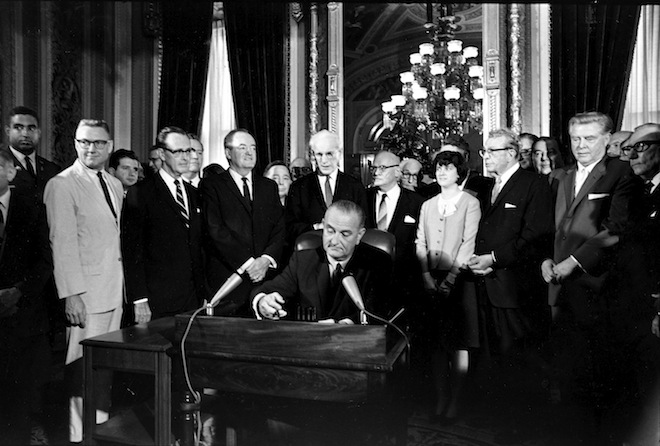A number of Republican senators Tuesday either didn’t know or wouldn’t say if they consider the Voting Rights Act to be constitutional, even though many of them voted to reauthorize it in 2006 and the Supreme Court is currently considering whether to invalidate a key section of it.
As they entered and exited weekly party luncheons Tuesday afternoon, I and other reporters asked many GOP senators if they consider a centerpiece of the law, which was battered by conservative justices during Supreme Court oral arguments last week, should be upheld. Every one of them dodged the questions, some more artfully than others.
“Uh,” said Sen. Lindsey Graham (R-SC), before a long, awkward pause, “I haven’t even thought about it.” He laughed and said, “I’ll leave that to the courts. I’m having a hard enough time being a senator, much less a Supreme Court justice.”
I asked the same question to Sen. James Inhofe (R-OK), who, like Graham, voted to renew the law in 2006. “The Voting Rights Act?” he asked. Yes, I said. Should it be upheld? “Oh, I don’t know,” Inhofe replied. “I’ll let someone else answer that.”
The landmark 1965 law has been reauthorized four times by Congress and was most recently renewed by a 98-0 vote in the Senate. Now some of the same senators who voted for it then aren’t sure about the validity of the law’s requirement that specific parts of the country with a history of racial discrimination win federal pre-approval before changing their voting laws. That requirement is at the heart of the current challenge to the law that is pending before the Supreme Court. The court’s five conservative justices — a majority — appear prepared to invalidate that portion of the landmark, half-century-old law which is widely considered one of the most successful civil rights law and a key instrument in ending Jim Crow in the South.
“I haven’t — I’m worried about other things,” said Sen. John McCain (R-AZ), nodding his head as he entered an elevator.
I asked Sen. Pat Toomey (R-PA), who was exiting a conference meeting and walking into the same senators-only elevator, if the law should be upheld. “Uh, I’m not…” he said. As the elevator door closed, he shrugged his shoulders.
Sen. Lamar Alexander (R-TN), a former leadership member who also voted to reauthorize the Voting Rights Act in 2006, similarly declined to answer.
“No, I am not going to try to be a Supreme Court [justice] and senator at the same time,” he told reporters. Is it constitutional? “That’s the question before the Supreme Court.”
Sen. Roy Blunt (R-MO), the vice chairman of the GOP conference, also wouldn’t answer.
“I think you asked me that already,” he said. I told him I had not. “Oh. I’m not following that court case. I’m interested in the topic. I used to be the chief election official for our state, but we weren’t under the Voting Rights Act and I haven’t been following the case.”
Sen. John Boozman (R-AR) said he hasn’t looked at or thought about the case.
“Somebody asked me about that earlier, and to be honest, I just haven’t looked at kinda what’s going on there,” he said. Asked if he agrees with Justice Antonin Scalia’s remark that Section 5 reflects a “perpetuation of racial entitlement,” Boozman said, “Well again, like I said, I haven’t thought about it or looked at it.”
Blunt and Boozman were members of the House in 2006 and voted for reauthorization.
Sen. Kelly Ayotte (R-NH) declined to provide a straight answer, but she got closer to addressing the substance than other GOP senators, saying laws should be reviewed “as times change” — a central argument that opponents of Section 5 advanced in court.
“My thought is the Supreme Court should evaluate it and make the decision and I’ll certainly respect that decision,” Ayotte told reporters. Asked if she has any feeling either way on the case, she said, “I think it’s always important as times change to review laws, and this is obviously what the Supreme Court will be doing with respect to the Voting Rights Act.” Pressed a third time, the freshman senator said, “This will be litigated and addressed by the Supreme Court, which is the appropriate body to decide this.”
Democrats, in contrast, have clearly stated that the law should be upheld. One month ago, Senate Majority Leader Harry Reid filed an amicus brief urging the justices to vote in its favor.
“Voting is the most fundamental of our rights as Americans, and the Voting Rights Act is one of the most important laws Congress has ever passed. The Voting Rights Act, and in particular Section 5 of the law, provides crucial protection for minority voters living in jurisdictions with a history of racial discrimination,” Reid wrote. “This law was reauthorized in 2006 and passed the U.S. Senate by a vote of 98-0, based on an extensive legislative record. Congress recognized that unfortunately bigotry still exists in this nation, and that there are still those who would seek to suppress the vote on the basis of race. Indeed, during the 2012 election cycle, insidious efforts were made in various states to suppress voter turnout in minority communities.”






